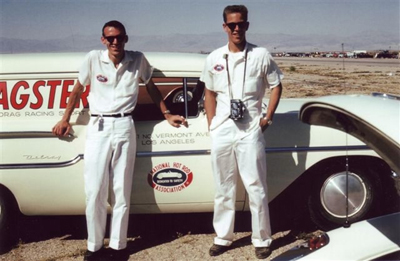

Thanks for the memories, Dick
 A few years ago, Dick Wells sent me this great photo of him, left, with DRAGSTER's first photo editor, the late Rich Joy, standing next to a nice sedan delivery with DRAGSTER signage. Wells said the photo was taken by Wally Parks at Inyokern Dragstrip in the high desert north of Los Angeles in 1962. |
How do you say goodbye to the guy who invented your job?
Last night, the NHRA family lost a precious member and a longtime friend to many in our world when Dick Wells passed away after battling complications from recent surgery.
Wells was the first editor of National DRAGSTER, handpicked by NHRA founder Wally Parks to oversee the creation of NHRA's newly born house organ. Wells served in that role through 1960 and returned for a second tour from 1961 to 1963 after our second editor, Bruce Tawson, left.
In my long career here at NHRA, including more than 20 years atop the National DRAGSTER masthead, I've had a lot of father figures to guide the way, led, of course, by Parks himself, but also including guys like Leslie Lovett, John Raffa, and Neil Britt, who all saw something in me worth helping and molding. Dick Wells didn't fit that mentor definition, but he was more like the kind uncle always there to offer encouragement and clarification, and one who helped show the way.
With his passing, I've lost another one of the fraying connections to our past, who are slipping through our fingers more and more each year. Wells' history in hot rodding was long and thorough, and his memory was sharp and fine, and I'll miss being able to lean on him for clarification of NHRA's past.
In the years leading up to Wally's passing, I had milked him endlessly for details about his life and NHRA's birth, eager to get it all on the record before we lost him. After Wally's death, Wells was the go-to guy about Parks. The two had been inseparable for years, and you always knew that Dick had Wally's back. Woe be it to anyone who tried to mess with Wally's legacy, or with the NHRA for that matter. Dick was fiercely protective of both.
Although we didn’t always agree, Wells knew and understood the pressures and give-and-take of being the editor of a house organ, and he was unfailingly flattering in attaboy e-mails he'd send me from time to time. Because of who he was and because of his grasp of the challenges of this job, I'd save those e-mails like little treasures.
From 2001: "Just spent time going through the August 10 edition of Dragster and it is nothing short of fabulous. How you continue to turn out winners each week is beyond my grasp, but it is to the pleasure of us all that you do so."
Or this gem, which contains advice we all should live by: "Many years ago, when I was the feature editor of Hot Rod magazine, I covered the Nationals. In the wake of the feature we received several complimentary letters. One was worded, 'I felt like I was there.' Tex Smith, also on the HR staff at the time, said, 'That's what we must all strive to accomplish.' And you, Phil, seem to accomplish that goal with virtually every issue."
 |
Although I am saddened by this loss, I am glad that I got to spend some quality time with Dick at the opening of the National DRAGSTER exhibit at the Wally Parks NHRA Motorsports Museum presented by Automobile Club of Southern California last year. To celebrate our 50th year of publishing, we gathered some of the editors – including me, Wells, George Phillips, and Jim Edmunds – and Dick and I were the speakers.
Those who know me know that I generally shun the spotlight and abhor public speaking – there's no erase, cut and paste, or grammar checking in live speaking – so, other than the thrill of representing National DRAGSTER at this special opening, I initially wasn't very thrilled with the speaking assignment. Initially, the plan was for Dick and me to address the crowd separately, but that quickly changed to a combined appearance at the microphone.
Dick and I exchanged e-mails in the days preceding the opening to share our thoughts, and, ultimately, he said we should toss out any scripted stuff and just wing it, to essentially riff off of each other's comments to compare and contrast the job now and then. It went smashingly well.
Dick was a natural and gifted storyteller and had the audience's rapt attention as he wove tales about the production of the first issue – like how Wally had to write a personal check to the printer before he'd roll the presses – and the challenges of working with the technology of the day. We traded barbs about how one another's jobs were so easy, and I honestly didn't plan anything I was going to say until Dick was partway through his story. When he'd complain about the sweatshop toil of working with hot-type printing and how easy we have it today with e-mail and the Internet, I'd jab him about having to cover just one national event a year compared to our 23. It was all in good, clean fun and seemed to go over well, and both of us took our turn lionizing (and canonizing) Wally and what he meant to us. I'll always remember that day.
Dick died 10 days short of his 76th birthday and 21 days shy of the 50th Anniversary Winternationals, which I know he would have enjoyed immensely because it involved so many of the friends he'd gained along the way. We'll all miss you, Dick. Thanks for everything.




















































